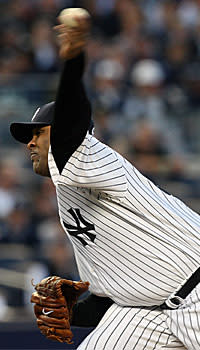Three-man rotations: The good, bad and ugly
Just in case Joe Girardi decides to stick with this whole three-man-rotation bit in the American League Championship Series, a little good-cop, bad-cop treatment is in order. This being New York and all.
Good cop: Hey, did you know CC Sabathia(notes), who under Girardi's plan would go on three days' rest in Game 4, pitched on that little time off three straight games last season and gave up two runs in 21 2/3 innings?
Bad cop: Yeah, but did you realize that of the 37 times this decade pitchers have started postseason games on three days' rest, their teams have lost 27?

Yankees lefty CC Sabathia is slated to start Friday's Game 1 of the ALCS against the Angels.
(Jim McIsaac/Getty Images)
Good cop: Fine, but of those 37 guys, 24 gave up three runs or fewer.
Bad cop: And only 13 went six or more innings.
Good cop: Why are you so negative?
Bad cop: Because the last time the Yankees used a pitcher on short rest in the playoffs, in 2007, Chien-Ming Wang(notes) couldn't muster an out in the second inning.
Good cop: Your point?
Bad cop: Well, nothing, aside from the fact that the previous time came in Game 7 of the 2004 ALCS – remember that one? – when Kevin Brown lasted only one out longer than Wang.
Good cop: OK. That's enough. Pettitte went 8 2/3 innings and didn't give up an earned run in Game 2 of the 2003 World Series. He went on short rest. So there.
Bad cop: Fine. We can drop the three-days' rest issue and pick up the three-man rotation one.
Good cop: It's understandable why Girardi wants this. Joba Chamberlain(notes) is too inconsistent as a starter and too handy out of the bullpen. Chad Gaudin(notes), for all his solid down-the-stretch numbers, remains Chad Gaudin. Which leaves Sabathia for Games 1, 4 and 7 and, on regular rest, A.J. Burnett(notes) for Games 2 and 5 and Andy Pettitte(notes) for Games 3 and 6. Sounds all right.
Bad cop: Until you look at the other attempts at a three-man rotation this decade. They're obsolescent. The Los Angeles Dodgers tried in last season's NLCS. They won't bother in the rematch after bombing out against Philadelphia in five games. Oakland did it in the 2002 and 2003 division series and lost both. And then there were the 2001 Braves, who, even with Greg Maddux(notes) and Tom Glavine(notes), got marauded by the Arizona team that ended up winning the first championship post-Yankees dynasty.
Good cop: That is painful.
Bad cop: Sorry. Just remember, Sabathia is his own player, one whose body stands up to abuse well; and the Yankees are their own team, not the Dodgers or A's or Braves; and all of this is history, which isn't applicable to these Yankees and these Angels and the series they're about to play.
Good cop: Thanks for the encouragement. The Yankees have a chance to make history, not fall victim to it. In fact, this series could be –
Bad cop: Painful. Don't forget that. You're the one who said it.
In the fun-with-small-sample-sizes department, here are the hitters with the most and least success against the projected pitchers in Games 1 and 2 of the NLCS.
Game 1
Clayton Kershaw(notes): Two starts against Philadelphia, and control problems as usual, with seven walks in 10 1/3 innings.

Utley
Best: Chase Utley(notes) (.300/.417/.700 in 10 at-bats)
Worst: Shane Victorino(notes) (.125/.125/.125 in eight at-bats)
Cole Hamels(notes): In four career starts against Los Angeles, crushed it each time: a 1.50 cumulative ERA and 26-to-3 strikeout-to-walk ratio.
Best: Russell Martin(notes) (.273/.333/.545 in 11 at-bats)
Worst: Andre Ethier(notes) (.100/.100/.200 in 10 at-bats)
Game 2
Vicente Padilla: Surprise nod for a pitcher who joined the Dodgers in late August and hasn't pitched against Phillies this year.
Best: Raul Ibanez (.321/.394/.536 in 28 at-bats)
Worst: Pedro Feliz (.222/.222/.222 in nine at-bats)
Cliff Lee(notes): Never pitched against the Dodgers. Most of his matchups come from the AL.
Best: Manny Ramirez(notes) (.429/.571/1.071 in 14 at-bats)
Worst: Jim Thome(notes) (.208/.310/.333 in 24 at-bats)
Soon, barring Dan O'Dowd wanting to test general-manager free agency – and he's got good enough reason to – the Colorado Rockies will sign him to a contract extension that hands him the keys for another few years to the team he fashioned into a 2007 playoff contender, rejiggered last season and sent back to the postseason this year.
O'Dowd is in a similar position to that of 2008: entering the season with heightened expectations and a young core. Perhaps this group is better suited to build upon its success, especially with the pursuit of deals for outfielder Brad Hawpe(notes) and third baseman Garrett Atkins(notes). Hawpe was marginalized this postseason by rookie outfielders Dexter Fowler(notes) and Carlos Gonzalez(notes) (who plays like a left-handed-only Carlos Beltran(notes) – and who for the next five years should help Rockies fans forgret the Matt Holliday(notes) trade). Atkins just stunk most of the season, and extracting anything for him would be a victory.
Playoff alert, circa 2015: Though it won't make any scrolling news ticker, the Washington Nationals' impending hire of Atlanta scouting director Roy Clark will be a watershed day in the franchise's history. Clark, who will serve as an assistant GM in charge of scouting and player development, ran the Braves' scouting department for the last decade and is among the game's most respected talent evaluators.
Among his selections since 2000: Adam Wainwright(notes), Brian McCann(notes), Tommy Hanson(notes), Yunel Escobar(notes), Adam LaRoche(notes), Matt Harrison(notes), Jarrod Saltalamacchia(notes), Jeff Francoeur(notes), Kyle Davies(notes), Kelly Johnson(notes), Zach Miner(notes), Dan Meyer(notes), Kris Medlen(notes), Jordan Schafer(notes) and the best prospect in the minor leagues, outfielder Jason Heyward.
Between GM Mike Rizzo and Clark, the Nationals are doing things right. Finally.
